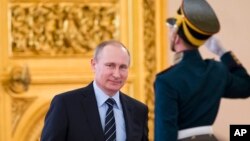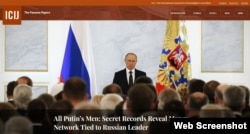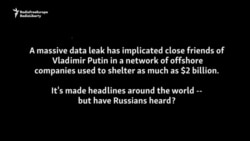With a Kremlin spokesman promptly dismissing allegations of Russian President Vladimir Putin's involvement in large-scale money laundering, Russian state media offered little, if any, coverage of the massive journalistic report that has dominated headlines worldwide.
Yet online, Russian opposition voices attempted to grapple with just what impact the International Consortium of Investigative Journalists (ICIJ) investigation might have on the Russian political scene.
Leonid Volkov, an opposition blogger, took on state media journalists for their notable silence in the wake of the ICIJ report.
"The investigation has shown the complete absence of shame, conscience, and common sense among 95 percent of Russian journalists," noted Volkov in a post to his Twitter account.
Others commented that the ICIJ report — while remarkable — had simply scratched the surface of corrupt dealings.
"It's important to understand: this investigation is based on just one Panamanian firm," wrote Russian opposition politician and anti-corruption crusader Alexey Navalny in a post to his blog.
"So it's just the tip of the iceberg of offshore holdings by bureaucrats, and just a small piece," wrote Navalny, calling for Russians implicated in the investigation to face possible jail time.
Thefts matter
Elena Panfilova, the head of the anti-corruption organization Transparency International, said the Panama Papers reminded her of a favorite phrase of her grandmother's growing up in Russia.
"In the end," wrote Panfilova on her Facebook account, "the truth always comes out."
Vladimir Varfolomeev, a journalist with popular Echo of Moscow radio station, sought to remind Russians inured to corruption among the Russian elite that the findings were, indeed, significant.
"You say that millions and billions don't make an impression?" asked Varfolomeev. "It seems to me that it's important to remember one simple thing: Presidents or ministers who steal even a few thousand are still criminals."
Jokes, too, centered on the alleged role of Sergey Roldugin, a cellist and childhood friend of Putin's, implicated in the offshore schemes.
A widely shared video by Current Time TV, an online news service, jointly produced by VOA and RFE/RL combined a taped solo performance of Roldugin playing the cello with a speech by the Russian leader proclaiming an end to offshore holdings.
Political ramifications?
But Dmitry Gudkov, a rare voice of opposition in the state Duma, insisted that — in exposing Russian elites' shady financial practices — the report had elicited, in his words, "panic in the Kremlin."
"After this, it's clear that no quiet old age awaits the kleptocracy: their money will be seized, and with it, a widening ring that ends in handcuffs overseas," Gudkov wrote online.
Yet it was Volkov, the blogger, who suggested the ICIJ report might prove an ominous development for Russia's own internal politics.
Writing on Facebook, he noted that while the elite in other countries indicated in the Panama Paper report might face prosecutions, scandals, or perhaps even no charges at all, experience told him the news would ricochet in Russia in negative ways: The Kremlin, Volkov wrote, will "launch several criminal cases against the opposition and ban something on the Internet."
WATCH: Muscovites React to 'Panama Papers' Implicating Putin







